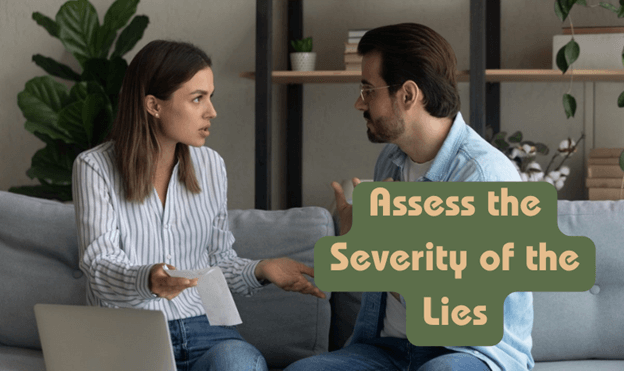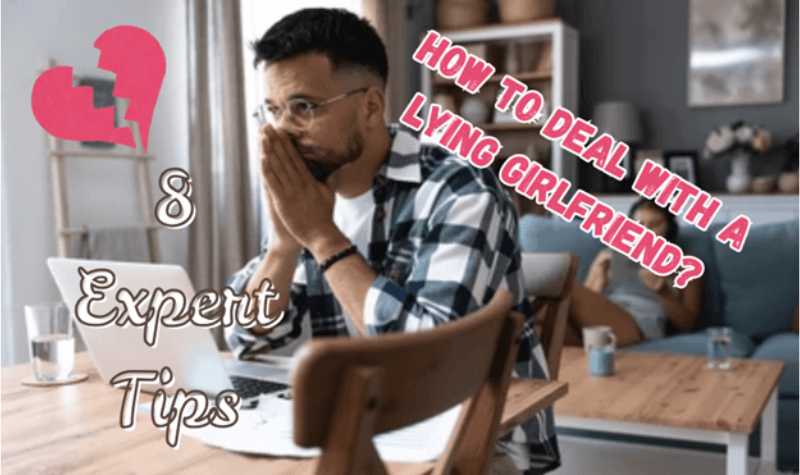Any relationship relies on trust, and breaking it can leave you hurt, in disbelief and unclear of what to do. Love requires vulnerability, but what happens when dishonesty ruins it? So let’s discuss how to deal with a lying girlfriend today!
It is hard to trust your girlfriend when she lies, and you start to doubt her love, goals, and plans for the future with you. It is hard to trust your girlfriend when she lies, and you start to doubt her love, goals, and plans for the future with you. No matter what kind of lie it is, it is awful and simple to feel lost afterward.
Handling lying well is good for both your mental and emotional health. This article has 8 professional tips on how to deal with a lying girlfriend. These tips include how to heal, rebuild trust, and decide if you can fix your relationship or let it go.
How to Deal With a Lying Girlfriend?
1. Recognize the Signs of Lying
In love, it is simple to trust without question, yet dishonesty may be there in front of you, even if you do not notice it. It starts with small errors in her story and missing facts. She may not look at you or become defensive when you ask basic questions. Also watch her body language: crossed arms, fidgeting, or a lack of openness could indicate true discomfort.
You should look into these signs, but she might not be lying. Always pay attention to what she says and when she rests and then talks again. Wait to make up your mind, and follow your gut. Pay attention, do not lose your cool, and let your partner tell you the truth.
2. Confront the Issue Directly and Calmly
Feeling odd makes it hard not to behave impulsively. I promise you that calmly facing a lie is stronger than accusations. Replace “You lied to me” with “I have seen something that does not match up, and it has been worrying me.”
Focus on your thoughts and facts, not assumptions or emotions that might exaggerate the conversation. Keeping a level mind lets you both communicate honestly, even when anger and hurt are easy to feel. Make time to talk to her—do not force it on her in a crisis. Tell her you want an important chat when she is easy. Respect keeps you both focused on the problem, not the moment.

3. Understand the Root Cause of the Lies
Lies generally originate from fear or insecurity, thus it is easy to feel betrayed when someone you love lies. She may fear judgment or be embarrassed of her actions. Lying may prevent tension or protect relationships from uncomfortable truths. Knowing this may help you understand. Instead of feeling upset or angry, ask why she lied.
Here, you’ll identify the reason behind the lie, not reject it. You should avoid impatience and engage your girlfriend with empathy and questions. Ask gentle, open-ended questions such, “What made you feel you couldn’t tell me the truth?” Understanding the emotional context of the lies may heal and enhance your relationship.
4. Assess the Severity of the Lies
Sometimes you need to step back and assess the nature of lying. To avoid a fight, she may say she is “fine” when she is not. When lies get serious, like hiding something important or violating trust, the relationship crumbles.
Is this a one-time event or a pattern? One-time lies are easy to forgive, but frequent dishonesty can indicate deeper difficulties. If you are not sure of how to handle the issue, ask for advice. Couples therapy or counseling can help you understand each other in a secure environment. Assistance from experts may help you identify and solve the issue.

5. Set Clear Boundaries for Trust
To restore trust, set limits. Discuss that dishonesty, secrecy, and contempt are unacceptable going forward. Communicating what you need to feel comfortable in a relationship is essential. Limits protect your mental health, not control it. Clarify what you expect to feel valued and avoid misunderstanding.
It takes time, but honesty and effort may rebuild trust. First, communicate openly and maintain promises. Reliable actions, not words, set up trust every day. Restoration is two-way, so wait. It takes time to restore trust.
6. Take Time to Reflect on Your Own Feelings
Dishonesty might make you feel a lot, but it is important to stand back and review. Are you hurt deceived, or just confused? Is the relationship still promising? Let your emotions settle before making huge decisions. Self-awareness matters. Consider what you want from a relationship and whether this one can provide.
Do you want to overcome the damage or is the dishonesty a dealbreaker? Consider whether staying out of fear or love is beneficial for your mental health. It is challenging, but trusting your instincts might help you determine whether to collaborate or go alone.
7. Consider Seeking Professional Help
Sometimes dishonesty hurts so deeply that it is impossible to survive alone. Seeing a therapist or relationship counselor may make all the difference. This is a step toward healing, not failure. Therapy may help you stop the cycle of misunderstanding, unresolved difficulties, or repetitive habits.
A neutral third person may provide insights, lead talks, and create a secure environment for partners to share their thoughts. Communication, empathy, and conflict resolution skills taught in therapy help rebuild trust. With the correct advice, you can overcome your barriers and build a better, more honest relationship. Give your love the skills to develop through tough times.

8. Decide Whether to Stay or Leave the Relationship
You must decide whether to fight for this relationship or just end it. It can be painful to think about the pros and cons of staying with a girlfriend who lies. Maybe you can repair if the lies are few and the love is strong. If dishonesty has become a pattern, destroying your trust and peace of mind, you may choose to leave.
Your mental wellness is as vital as your relationship. Self-respect includes not accepting long-term dishonesty, particularly if it hurts or confuses you. Can you heal and trust again? Or does this relationship drag you down? Trust your gut—sometimes leaving is the bravest and most loving thing you can do for yourself, enabling both of you to develop and go on.
Conclusion
Trust is an important part of any good relationship, and breaking it can make both people feel unsafe. You deserve a relationship with your girlfriend to whom you can trust, treat with care, and talk to.
Whether you rebuild trust or move on, prioritize mental wellness. If your girlfriend is lying or treating you badly or does not trust you, you should end the relationship. Reflect, communicate openly, and prioritize well-being. Safe, nurturing love should not be dubious and uncomfortable. Use your emotions to decide.



